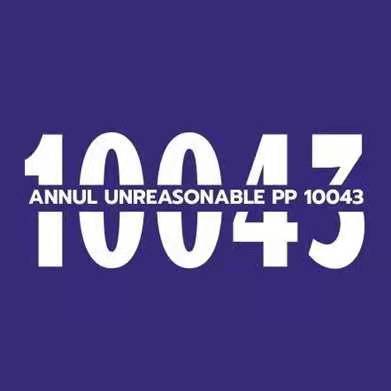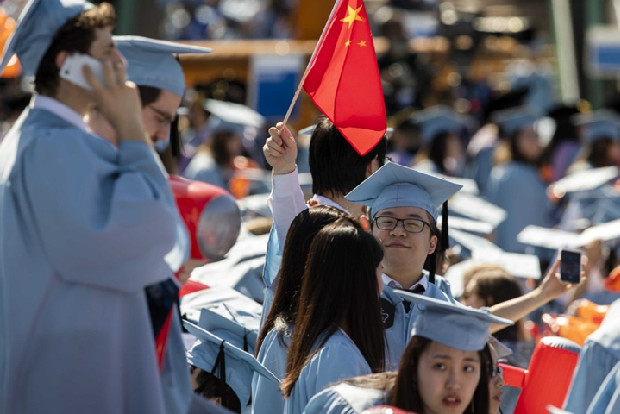In May, 2020, former President Donald Trump of the United States signed Presidential Proclamation 10043 (hereinafter PP 10043), which aims to “suspend and limit” the entry into the U.S. of the Chinese citizens seeking to study or conduct research via an F or J visa.
In May this year, the U.S. Embassy and Consulates in China restarted visa services for students. In early August, the U.S. announced that Chinese students would get their visas before the start of the fall semester as the number of Chinese students to the U.S. rebounded to pre-pandemic levels.
However, visas for graduate students in certain high-tech or strategic fields are subject to more stringent assessment. After a year of anxious waiting, some applicants finally received their visas. But many students from eight Chinese leading science universities, which have always been US targets as they are believed to have links to the Chinese military, are still being excluded.
For six months, Chinese students denied access to the U.S. have been building an Internet community, where they help each other and speak out together while waiting for their chances.
Foreign Ministry spokespersons Zhao Lijian and Wang Wenbin once urged the U.S. to stop the unwarranted restrictions on Chinese students, and strongly condemned the U.S. for this "historical reversal". Some prominent figures in the U.S. education sector have also pointed out the unreasonableness of PP 10043.
To date, those affected students are still fighting for their dreams.

Dream shattered by groundless restriction
How many people are affected by PP 10043?
The U.S. has repeatedly claimed that PP 10043 will only affect less than 2% of Chinese applicants. However, a report from Georgetown University shows that at least 3,000 to 5,000 Chinese graduate students in related disciplines will be blocked each year, which amounts to 16% to 27% of the total number of Chinese graduate students studying in the U.S.
Denial of visas is the biggest obstacle for many Chinese students to study in the U.S.
Zhang Nan studies in Carnegie Mellon University, the school promised to help students affected by PP 10043, however, it turned out to be more like moral support. "Now, the school allows me to suspend schooling and wait, but the policy in the U.S. changes so fast and I really can’t imagine what it will be like after a year."
Zhang Nan, who made great efforts to enter this university, was expected to graduate and return to China after finishing one semester of offline courses. But he was caught off guard by PP 10043. Zhang Nan strongly disagreed with this one-size-fits-all visa denial. In his view, the U.S. is obviously using the students to suppress China's talent development, "PP 10043 is nonsensical. Science and technology development should never be curbed by oppressing academic exchanges. We should compete in a dignified manner."
Many students’ visas have been rejected, and Guangdong student Qing is one of them. "Regardless of China-US relations, scientific research has universal values."
Qing received a PhD program in the field of computer science from a U.S. polytechnic college. Qing has always wanted to engage in scientific research, as the U.S. takes the lead in this area at present. If PP 10043 continues, it will be extremely difficult for Qing to go to the U.S. for normal academic exchange even if she finishes her PhD in other countries, which will be a great obstacle to her academic development.

Graduate students from China attend the Columbia University Commencement ceremony in New York, the United States, May 22, 2019. (Photo: Xinhua)
Voices from multiple sides being heard
PP 10043 is a huge mountain in front of the students wanting to head to the U.S. and cannot be overcome with their own power. Many Chinese students who have been denied visas have petitioned their schools in the U.S., drawing the attention of some U.S. universities and prominent media outlets.
Wendy Wolford, vice-provost for international affairs at Cornell University in New York, has sent a letter to Secretary of State Blinken expressing her views and her hope that the U.S. State Department will soon develop guidelines for implementing PP 10043 and narrow the scope of entities to allow qualified students to study in the United States.
On July 9, Foreign Ministry spokesman Wang Wenbin urged the U.S. to face up to and review the issue. Wang said: “The current US administration keeps talking about the importance it places on openness to international students while playing by the rules set out in this deeply discriminatory Presidential Proclamation. This runs counter to the self-claimed philosophy of openness and freedom and remarks of "welcoming Chinese students" on the US side. It is further historical back-pedalling.”
Voices from various quarters have brought attention to PP 10043. Many Chinese students did not just sit still and wait. They founded the “Academia No Borders” (ANB) support group, set up accounts on both Chinese and American social media platforms, and created a bilingual website www.10043.org to share related information, media coverage, and latest progress. There are more than 2000 Chinese students in the group.
In May 2021, students in the ANB support group united and prepared for a lawsuit against the U.S. government. A group member told the reporter that after prudent selection, they contacted Ira Kurzban, a highly-regarded attorney in the U.S. Ira believes that it is difficult to cancel PP 10043 through litigation. However, PP 10043 has obviously seen excessive enforcement and the criteria are too broad and ambiguous.
Since each visa applicant should be investigated as an individual case, it is possible for the U.S. government to cancel PP 10043 if the lawsuits and media campaign are influential enough. Subsequently, the support group launched a fund-raising campaign, with many students, parents and even some of the students' U.S. mentors making donations. A total of $120,000 has been raised so far, but it takes $350,000 to start the lawsuit. Students responsible for the lawsuit process continue to negotiate with their attorney in the hope of reducing or even halving the start-up funds.
Fund-raising for a lawsuit, the media campaign......students in ANB are still trying to fight against PP 10043 in many ways. It is not known when the “battle of rights” can succeed. Nonetheless, many of them will not give up, even if they may have a long way to go.
(Pseudonyms are used in the story at the request of the interviewees.)
Reporter | Xu Mian, Li Yeshen, Xiao Buyun (intern)
Planning | Wu Qing
English version| Huang Yanting (intern)
English editor | Keane, Hannah, Jerry




